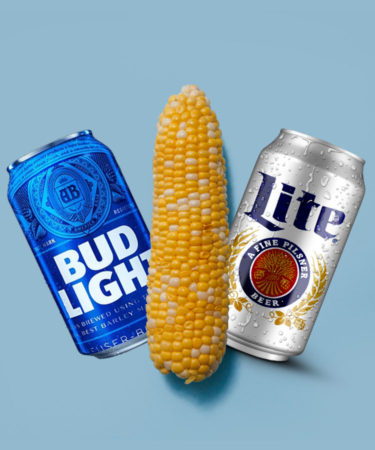
On Super Bowl Sunday, Anheuser-Busch InBev aired a pair of Bud Light ads claiming the brand does not use corn syrup in its beer. It also posited that competitor brands Miller Lite and Coors Light do.
The campaign has consumers confused, competitors pissed, and corn farmers sorely disappointed (seriously, they’re drain-pouring Bud Lights).
Miller Lite fired back with a snarky tweet on Sunday, pointing out that Miller Lite has “more taste and half the carbs” than Bud Light. MillerCoors followed up with a blog post explaining that corn syrup, a corn-derived sugar, is widely used in the beer industry, from “leading lagers to pastry stouts to pale ales to IPAs.” Specifically, the blog calls out craft stalwarts Sierra Nevada Pale Ale and Russian River Pliny the Elder as fellow corn syrup users.
The final kicker came on Tuesday, when Miller Lite ran a full-page ad in The New York Times about the #corntroversy. It explains that corn syrup (not bad) is not the same as high-fructose corn syrup (bad), and emphasizes that the ingredient “does not even end up in” your beer. (Corn syrup is used as a fermentable sugar, not a flavoring ingredient.) Oh, and it says Anheuser-Busch uses both corn syrup and high-fructose corn syrup in other brands. Yikes.
I’ll admit it: I thought Bud Light’s commercial was smart. It accomplished something other beer ads, and certainly other Bud Light ads, did not: It got people thinking about ingredients. And it did so without shaming consumers for liking certain flavors, as it has repeatedly done in the past.
However, it did shame MillerCoors for using an ingredient that, it turns out, does no real harm to beer, beer’s flavor, or your beer gut, for that matter.
The ad is ultimately a little fearmonger-y for my taste, but it got people thinking. I’ll take that over exploiting women, shaming mead drinkers, or shunning robots any day.
Sierra Nevada Acquires Sufferfest Beer
On Monday, Sierra Nevada Brewing announced its acquisition of Sufferfest Beer, a San Francisco-based maker of “functional alcoholic beverages,” Sierra Nevada president and CEO Jeff White said in a press release. The deal is expected to close in early April, Brewbound reports.
What are “functional alcohol beverages,” you ask? Sufferfest specializes in gluten-removed beers geared at athletic types, such as a 95-calorie kölsch-style beer brewed with bee pollen, and FKT (Fastest Known Time) Pale Ale made with salt and blackcurrant. The company name refers to “an extended endurance endeavor, such as a race or a hard workout,” Brewbound reports.
This is big news for small beer. The “will sweat for beer” ethos is not merely marketing; it speaks to a growing trend toward healthier beer and beverage alternatives among athletes and other health-conscious consumers. I see this as another viable avenue for beer and beer-adjacent drinkers, along the same lines as non-alc beer, low-cal and low-carb beer, kombucha, and CBD beverages.
Is “healthy” beer the next hazy IPA? Probably not, but I’m all for innovation. If people are hesitant to add beer to their workout routines, it’s better to have “beer for athletes” than no beer at all (or, God forbid, Mich Ultra).
Bell’s Brewery Pulls Out of Virginia
Virginia may be for lovers, but not for lovers of Bell’s beer. Bell’s Brewery announced it will cease shipments to the state, citing ongoing legal issues with the Virginia Alcoholic Beverage Control Authority (ABC).
A dispute over an attempted sale of Bell’s distribution rights from one distribution company to another is the cause. Apparently, Bell’s has a track record of not wanting to work with Reyes Beverage Group, the largest beer distributor in the country, because it fears the conglomerate will favor Big Beer brands over its smaller craft brews.
Founder Larry Bell can do whatever he wants with his beer, but is denying Virginia drinkers a beer they love the answer? I don’t think so. Bell told Brewbound that Virginia accounts for 5 percent of its beer sales, or the equivalent of about 300,000 cases of beer, “and growing.” Over-distributing has its own consequences, but in this case, pulling product out of what Bell describes as a “very good state” seems more rash than savvy.
The beer industry is suffering as a whole. Mid-sized, regional brewers like Bell’s are experiencing the brunt of this challenge. An unfortunate reality for brands of this size is that they require distribution partners to reach more people. Another unfortunate reality is that these partnerships, like all relationships, require compromise. Bailing on an entire state because you’re afraid your brand might get snubbed is not solving the problem, it’s running from it. The only solution I see is selling less beer in that state.
